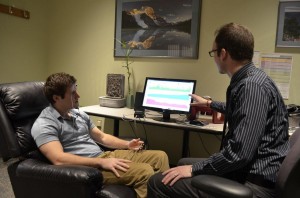
When everyday demands become too much to handle, students can call upon BYU-offered stress management services in the Wilkinson Center.
“We have a variety of stress problems that we have the students rate themselves on,” said Loren Brown, a graduate student in the doctoral program of counseling psychology. “These can by physical or psychological symptoms.”
Brown works with students in one-on-one appointments in the biofeedback services lab. After identifying an issue, he helps students figure out which relaxation technique to try. The student is then hooked up to biofeedback equipment, which measures a variety of responses, from hand temperature and sweat gland activity to heart rate variability.
The term “biofeedback” means stress from the body, and feedback is usually ignored until it becomes very serious.
“People have the ability to control their stress,” said Maureen Rice, PhD, a psychologist in the counseling center. “How we respond to stress is not automatic, but with practice we can learn how.”
Abby Twitchell, a junior studying sociology, has seen the benefits from the biofeedback lab in her own life.
“I thought it was very unique and eye-opening because it showed me something that I had never considered before,” Twitchell said.
Twitchell learned new breathing techniques from her appointment in the lab.
“The way that I breathe actually stresses me out,” Twitchell said. “So I was taught the optimal speed that I should breathe.”
She can now apply the techniques she learned to manage stress in her daily routines.
“When doing homework or making to-do lists I can feel myself getting stressed, and I think about what I learned,” Twitchell said. “Then I know I need to find the right rate and calm myself down.”
Sheri Knight, office manager of Counseling and Psychological Services, has also used biofeedback services.
“I initially did it to relay information to students and to increase my knowledge about it,” Knight said. “Then I wanted to recommend it because it was such a positive experience.”
Knight noticed the skills she learned in the lab were most useful when she practiced them daily.
“If I really incorporate the skills that I learned in my day I can see the difference that it makes,” Knight said. “It has made a huge difference in falling asleep at night.”
Resources are also available on the website at caps.byu.edu. The site includes relaxation recordings on everything from how to fall asleep at night to how to walk to the testing center.
“We want to help students increase their internal awareness of what their stress is,” Rice said. “Then they can calm down quickly and easily.”




